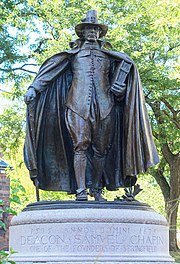| Part of a series on |
| Puritans |
|---|
 |
The Half-Way Covenant was a form of partial church membership adopted by the Congregational churches of colonial New England in the 1660s. The Puritan-controlled Congregational churches required evidence of a personal conversion experience before granting church membership and the right to have one's children baptized. Conversion experiences were less common among second-generation colonists, and this became an issue when these unconverted adults had children of their own who were ineligible for baptism.
The Half-Way Covenant was proposed as a solution to this problem. It allowed baptized but unconverted parents to present their own children for baptism; however, they were denied the other privileges of church membership. The Half-Way Covenant was endorsed by an assembly of ministers in 1657 and a church synod in 1662. Nevertheless, it was highly controversial among Congregationalists with many conservatives being afraid it would lead to lower standards within the church. A number of Congregational churches split over the issue.
The Half-Way Covenant's adoption has been interpreted by some historians as signaling the decline of New England Puritanism and the ideal of the church as a body of exclusively converted believers. For other historians, it signaled a move away from sectarianism. The Half-Way Covenant also opened the door to further divisions among Congregationalists concerning the nature of the sacraments and the necessity of conversion. Liberal Congregational churches extended church membership to all professing Christians, and in time many of these churches became Unitarian. The revivalism unleashed by the First Great Awakening was in part a reaction against the Half-Way Covenant.